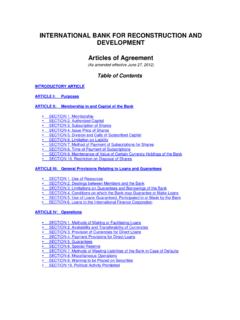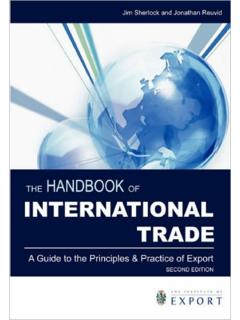Transcription of MASTER OF CORPORATE LAWS (MCL)
1 MASTER OF CORPORATE laws (MCL) SYLLABUS FOR 1st YEAR 1. Paper I: Basic Principles of Law. 2. Paper II: Law of Contracts - I. 3. Paper III: Law of Contracts -II. 4. Paper IV: Company Law. 5. Paper V: E-Commerce and Cyber Security. 6. Paper VI: International Trade Law. BASIC PRINCIPLES OF LAW (Paper I) Unit I Meaning of Law Sources of Law - Custom, Legislation and Precedent Conceptual Definitions Rights and Liabilities Legal Person Title - Possession and Ownership Liability - Contractual, Criminal and Tortious Liability. Unit II Salient features of Indian Constitutional Law Fundamental Rights Directive Principles of State Policy Fundamental Duties Centre State Relations Constitutional Provisions relating to Trade and Commerce.
2 Unit - III Basic Concepts of Property Nature and Types of Property - Sale Mortgage Lease Intellectual Property Rights Offences against Property Unit IV Hierarchy of Courts Jurisdiction - Powers and Functions of Civil and Criminal Courts. Unit V Meaning and Definition of International Law Sources of International Law Relationship between International Law and Municipal Law State Practices of International Law. LAW OF CONTRACTS I (Paper II) An understanding of Law of Contracts is quintessential as all commrecial interactions between persons and companies are through this modality, thereby making this sphere of Law of utmost significance to the society, trade and commerce.
3 The objective of this study is to provide the students, with an understanding of the law pertaining to formation & thereafter discharge of contracts and the redressal mechanisms afforded to the aggrieved parties. UNIT I: Basic nature of contract Formation of contract Offer, acceptance, revocation, lapse of offers and acceptance Intention to create legal relationship Standard form contracts. UNIT II: Consideration past, present, future considerations Privity of contract & consideration - Value & adequacy of consideration Exceptions to consideration Capacity to contract Free consent Coercion, Undue Influence, Misrepresentation, Fraud, Mistake Objects of a contract Unlawful & illegal objects or considerations valid, voidable, void agreements.
4 UNIT III: Performance of Contract Tender of performance - Time as essence to performance Law relating to time, place & order of performance Performance of reciprocal promises, contingent contracts, quasi contracts joint promises appropriation of payments. UNIT IV: Discharge of contracts Impossibility of performance Discharge by agreement-novation, recission, alteration Discharge by breach - Waiver Accord & satisfaction Material alteration Damages-types and measures. UNIT V: Specific Relief Act, 1963-recovery of possession-specific performance of contracts-rectification, cancellation of instruments-recission-declaratory decrees-injunctions.
5 READING MATERIAL: A. Statutory Material: a. Indian Contract Act, 1872. b. Specific Relief Act, 1963. B. Text Books: a. Dr. Avtar Singh Law of Contract & Specific Relief. b. Venkatesh Iyer Indian Contract Law c. M. Krishnan Nair Indian Contract Law. C. Reference Books: a. Cheshire & Fifoot Law of b. Anson s Law of Contract. c. Sarkar Specific Relief Act. d. Basu Specific Relief Act. LAW OF CONTRACTS II (Paper III) The objective of this study is to provide the students, with an in-depth understanding of the different kinds of contracts, their formation, the features which differentiate each type of contract, the rights, obligations and liabiliaties of the respective parties to such contracts interse and vis- -vis outsiders and the statutory provisions pertaining to each.
6 UNIT - I: Indemnity and Guarantee-Definition-Rights of the indemnity holder-Rights of the indemnified-Essentials and nature of guarantee-Distinction between guarantee and indemnity - guarantee and insurance-Elements of consideration in a contract of guarantee-Nature and quantum of surety s liability-Kinds of guarantee-Duty of disclosure in guarantee-Rights of surety against principal debtor-co-sureties-difference in English Law-discharge of surety. UNIT - II: Bailment-Definition-Essentials of bailment and classification of bailment-Distinction between bailment and pledge-deposit-sale-agency-Rights and duties of the bailor and bailee-Pledge & Hypothecation-Rights of the Pledgor and Pledgee-Pledge by non-owners-Lien-kinds of lien.
7 UNIT - III: Agency-Definition of contract of agency-Creation of agency-kinds of agency-Distinction between Agent and servant and independent contractor-Who may be an agent-kinds of Agent-Authority of the different kinds of Agent-Authority of Agents-Ostensible and authority in emergency-delegation of authority-delegatus non protest delegare-sub agent and substituted agent-Essential of ratification and its effect-Effect of notice to agent necessary conditions to bind Principal-Principal and third parties-The doctrine of unnamed principal-undisclosed principal and non-existent
8 Principal-Termination of agency and when it becomes irrevocable. UNIT IV: Sale of Goods-Definition of sale-Distinction between agreement for and agreement to sell-Contract of work-Hire purchase agreement-Exchange-Gift. Definition-goods specific goods-future goods-Mercantile agent-Documents of title of goods-Rules as to effecting sale of goods-Stipulation as to time-Conditions and warranties-when condition is treated as warranty. Rule as to passing off property-Nemo dat quod non habet and exceptions to this rule-Unpaid vendor-His Rights of lien and stoppage in transit and resale-Auction sale. UNIT V: Partnership-Definition of Partnership Essentials of partnership Limited Liability Partnership-Distinction between partnership and co-ownership-contract of service-legal notion and mercantile notion-Kinds of partners and duration of partnership-Mutual rights and duties of partners-Minor as a partner difference in English Law-Rights of Legal Representative and surviving partners-Authority of partners-implied and emergency-Liability of the partners of the acts of the firm and for the wrongful acts of other partner-nature of liability-Principle of agency in
9 Partnership-Partnership property-Tests-Settlement of accounts-goodwill and its disposal-distribution of assets-Retirement of partners-Dissolution of firm and modes and circumstances-Effect of non-registration of firm. READING MATERIAL: A. Statutory Material: a. Indian Contract Act, 1872. b. Sale of Goods Act, 1930. c. Partnership Act, 1932. B. Text Books: a. Dr. Avtar Singh Law of Contract & Specific Relief. b. M. Krishnan Nair Indian Contract Law. C. Reference Books: a. Howard Bennett Principles of the Law ofAgency. b. Pollock & Mulla The Sale of Goods Act. c. Markanda The Law of Partnership.
10 COMPANY LAW (Paper IV) Study of Company Law gains significance in the light of the fact that persons more often chose to do business in the form of companies, rather than as a partnership firm or in any other form. Thus, it has become inevitable on the one hand for the public to transact with companies, for instance Banking companies and on the other hand inter- CORPORATE transactions. Hence, it is pivotal to study about the significance, working & responsibilities of companies towards the public and in augmenting the economic progress of the Nation. The Companies Act, 1956 was replaced by The Companies Act, 2013.






